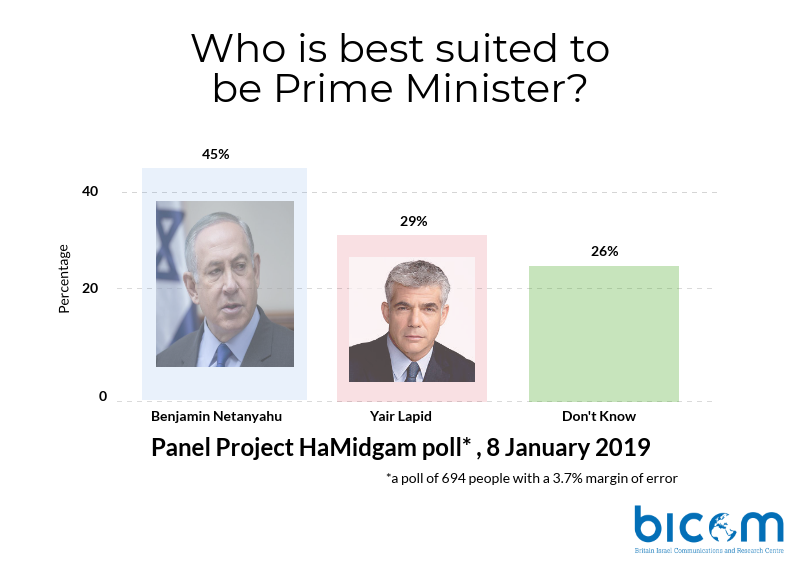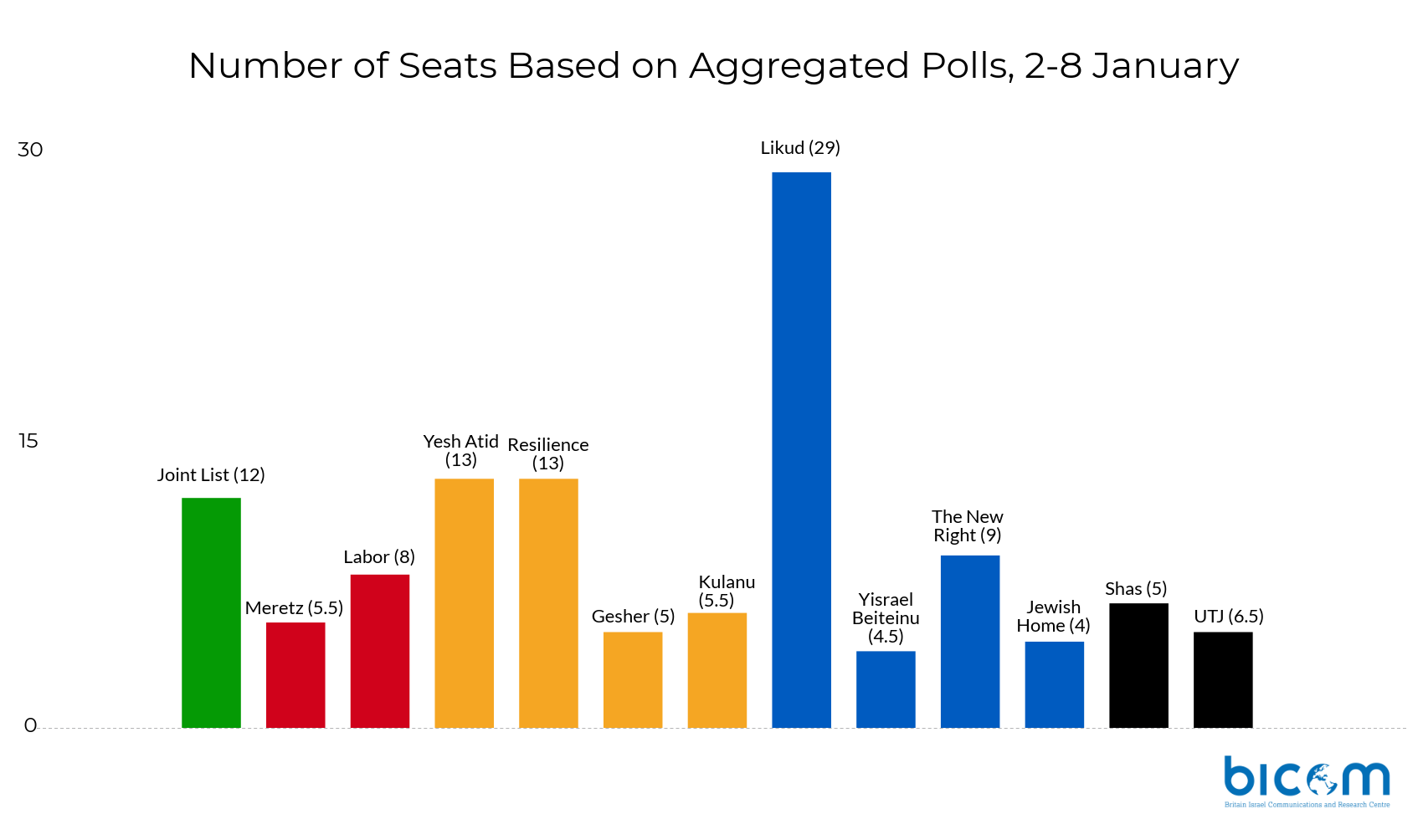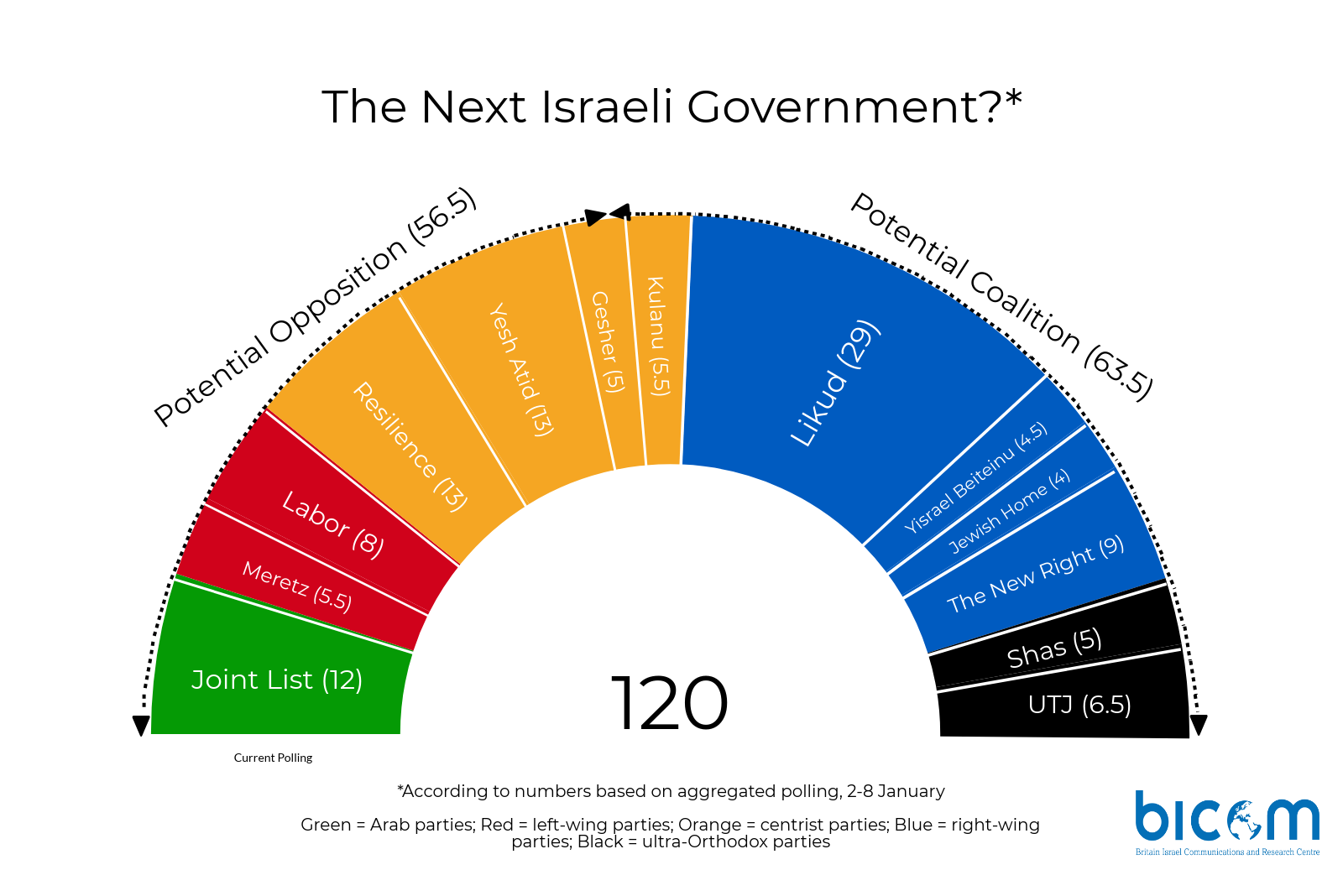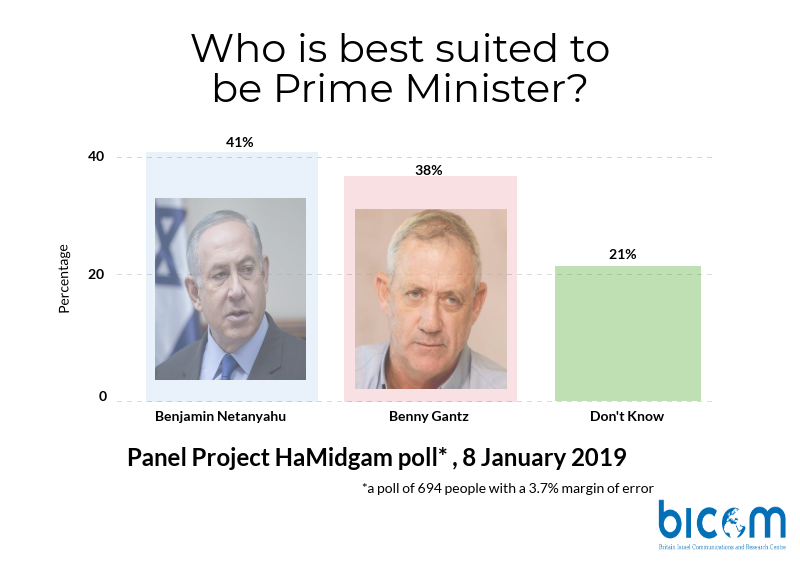#IsraeliElections: To Bibi or not to Bibi? That is the question.
As the Jewish state prepares to go to the polls in April, we look at all the power-players who are seeking office

Israel’s next election is due to be held on 9 April. Analysts think Benjamin Netanyahu will: a) be indicted at some point this year, b) still win the vote, c) be unable to command a majority when the indictment is announced or d) refuse to step down when it is. This could mean another election shortly afterwards. In any case, here’s the who’s who…
Likud (Consolidation)
The right-wing party may get more than twice as many seats as its nearest rival and continue to control a quarter of the Knesset. But a recent Channel 10 poll showed the public torn on their preferred prime minister – 41 percent said Benjamin Netanyahu, 38 percent said General Benny Gantz. If that translates into votes on party lines, Likud could slip, and if the Attorney General rules on Bibi’s indictment before the polls open, it gets very interesting. Not that it isn’t already: the judge overseeing the election has just told Likud to stop blocking a law extending propaganda restrictions to online content.
Get The Jewish News Daily Edition by email and never miss our top stories Free Sign Up
Predicted 30-33 seats.
HaYemin HaHadash (New Right)
The new right-wing party formed by Education Minister Naftali Bennett and Justice Minister Ayelet Shaked, formerly of religious-nationalist party Jewish Home, represents the religious and secular ultra-nationalists. The pair have just brought in some big name American Jews, including journalist Caroline Glick, so will continue to gain more media limelight than their polling justifies.
Predicted 8-10 seats
Yisrael Beitenu (Our Home)
Led by former Defence Minister Avigdor Lieberman, this struggling right-wing party won six seats in 2015, similar to previous years. Its base is Russian-speaking Israelis and its modus operandi is to sound a bit more hawkish than the hawks. The loss of Orly Levy-Abekasis, who left to set up her own party (Gesher), appears to be a deep and self-inflicted wound. Predicted 4-6 seats
Labor
Israel’s leading centre-left party has lurched to the right and seen its base dwindle. While it had 24 seats in 2015, when it was part of the Zionist Union with Tzipi Livni, most think it will halve in size this spring. Former leader Isaac Herzog never captured voters’ hearts, but new leader Avi Gabbay hasn’t even captured his party’s – three talented Labor MKs left last week (one saying Labor had “stopped talking about peace”) while another heckled him at the party conference, calling him a “liar”. To be fair, the heckler had a point – Gabbay absented himself from Labor’s
Chanukah do, saying he was “sick,” but was later pictured fit and well, holding meetings in the Gulf.
Predicted 8-16 seats.
Yesh Atid (There is a Future)
After its stunning political debut in 2013, winning 19 seats, the centrist party of former TV presenter Yair Lapid dropped to 11 seats last time. Since then, Lapid has been a fierce Netanyahu critic while still sounding hawkish in key areas. His focus remains socio-economic, while his call to end Charedi Jews’ military exemption is still resonant. If Likud finally loses power (unlikely), Yesh Atid will be in the mix. 
Predicted 13-15 seats.
Kulanu (All of Us)
Centrist and focused on economic issues, the party led by Moshe Kahlon won 10 seats at the last election and joined the coalition, but the honeymoon is over, and one of the party’s biggest names – former Israeli Ambassador to the US Michael Oren – is now leaving.
Predicted 4-6 seats.
Gesher (Bridge)
Founded by Orly Levy-Abekasis, the daughter of former Foreign Minister David Levy who became a TV and fashion star before being elected to the Knesset as a member of Lieberman’s Yisrael Beiteinu. She left two years ago, after he snubbed her for a ministerial job. An independent-minded centrist campaigning on a popular social policy platform, she’s one to watch – her father, David Levy, became Israeli Foreign Minister, so it’s in the blood.
Predicted 4-8 seats
Hosen Yisrael (Israel Resilience)
This year’s big news story is the new party of ex-IDF Chief of Staff Benny Gantz, quickly dismissed as a “hologram” by Yair Lapid. Gantz, who has also teamed up with former Chief of Staff and Defence Minister Moshe Ya’alon, was also attacked as “a leftie” by right-wingers this month, after saying he’d amend the controversial Nation State Law, which critics say treats non-Jews as second-class citizens. Gantz knows the sacrifices Druze Israeli soldiers make, so he probably takes the law personally. All signs suggest he will be a power-broker, and there’s already talk of backroom deals.
Predicted 14-16 seats.
Meretz (Vigour)
Stalwart of old-school left-wing liberal values and champion of green issues, its critics have long predicted the party will fold, saying you cannot be both Zionist and left-wing because the two are “contradictory”. Yet here we are in 2019 and the party is still there, fighting the good fight.
Predicted 4-5 seats.
Israel-Arab Parties
At the last election, Joint List won 13 seats, but Knesset Member Ahmed Tibi is now withdrawing his Ta’al faction (Arab Movement for Change) to run independently.
Both Joint List and Ta’al are predicted 6-7 seats.
Charedi Parties
United Torah Judaism won six seats at the last election, but is expected to grow slightly now that Agudath Yisrael (a Chasidic party) and Degel HaTorah (whose roots are among the more strict Lithuanian orthodox) have said they are on board. Shas, until now the biggest Orthodox party with seven seats at the last election, may slip a little.
The two parties are expected to win 12-13 seats, as their demographic only grows.
No seat wonders?
Magen Yisrael (Shield)
The new party launched by former IDF Brigadier-General Gal Hirsh in January. Most feel he would be best joining Gantz.
HaBayit HaYehudi (Jewish Home)
Formerly led by Naftali Bennett, last time it won eight seats and joined the coalition. But Bennett and his number two, Shaked – both opposed to a Palestinian state – left to set up their own party, followed by most donors. The party will probably crash.
Hatnuah (Movement)
Led by ex-Israeli Foreign Minister and two-state supporter Livni, the party was in the Zionist Union with Israel’s Labor, but in a bizarre conference in December, Labor’s Avi Gabbay ditched her on live TV – sitting next to him, she hadn’t been told. In a put-down, she later told the press: “The days when you proved you were a man by humiliating women are over.” Livni remains a draw for some, so expect her to pop up as someone’s running mate, but for her party to fold.
Zehut (Identity)
Led by veteran right-wing agitator Moshe Feiglin, it favours annexing the West Bank, paying Palestinians to leave and promising citizenship to those who “prove” they want to be Israeli. He also wants to legalise cannabis
and abolish the Chief Rabbinate’s monopoly on Jewish life-cycle events and kashrut.
Tkuma (Resurrection)
An extreme right party led by fanatical settler Bezalel Smotrich, who seeks Israeli sovereignty in the West Bank. Once arrested in connection with violent protests, he opposes construction permits for Palestinians, wants to legalise illegal settler outposts, supports segregation in hospital, says Palestinian stone-throwers should be shot, and thinks LGBT Jews control the media.

Thank you for helping to make Jewish News the leading source of news and opinion for the UK Jewish community. Today we're asking for your invaluable help to continue putting our community first in everything we do.
For as little as £5 a month you can help sustain the vital work we do in celebrating and standing up for Jewish life in Britain.
Jewish News holds our community together and keeps us connected. Like a synagogue, it’s where people turn to feel part of something bigger. It also proudly shows the rest of Britain the vibrancy and rich culture of modern Jewish life.
You can make a quick and easy one-off or monthly contribution of £5, £10, £20 or any other sum you’re comfortable with.
100% of your donation will help us continue celebrating our community, in all its dynamic diversity...
Engaging
Being a community platform means so much more than producing a newspaper and website. One of our proudest roles is media partnering with our invaluable charities to amplify the outstanding work they do to help us all.
Celebrating
There’s no shortage of oys in the world but Jewish News takes every opportunity to celebrate the joys too, through projects like Night of Heroes, 40 Under 40 and other compelling countdowns that make the community kvell with pride.
Pioneering
In the first collaboration between media outlets from different faiths, Jewish News worked with British Muslim TV and Church Times to produce a list of young activists leading the way on interfaith understanding.
Campaigning
Royal Mail issued a stamp honouring Holocaust hero Sir Nicholas Winton after a Jewish News campaign attracted more than 100,000 backers. Jewish Newsalso produces special editions of the paper highlighting pressing issues including mental health and Holocaust remembrance.
Easy access
In an age when news is readily accessible, Jewish News provides high-quality content free online and offline, removing any financial barriers to connecting people.
Voice of our community to wider society
The Jewish News team regularly appears on TV, radio and on the pages of the national press to comment on stories about the Jewish community. Easy access to the paper on the streets of London also means Jewish News provides an invaluable window into the community for the country at large.
We hope you agree all this is worth preserving.
- News
- Analysis
- Features
- Israeli elections 2019
- Knesset
- General Benny Gantz
- HaYemin HaHadash (New Right)
- Yisrael Beitenu (Our Home)
- Yesh Atid (There is a Future)
- labor
- michael oren
- Kulanu (All of Us)
- Gesher (Bridge)
- Meretz (Vigour)
- Joint List
- Ta’al
- Israeli Prime Minister Benjamin Netanyahu
- Britain Israel Communications and Research Centre (BICOM)
- Likud Party
-
By Laurent Vaughan - Senior Associate (Bishop & Sewell Solicitors)
-
By Laurent Vaughan - Senior Associate (Bishop & Sewell Solicitors)
-
By Laurent Vaughan - Senior Associate (Bishop & Sewell Solicitors)
-
By Laurent Vaughan - Senior Associate (Bishop & Sewell Solicitors)

























